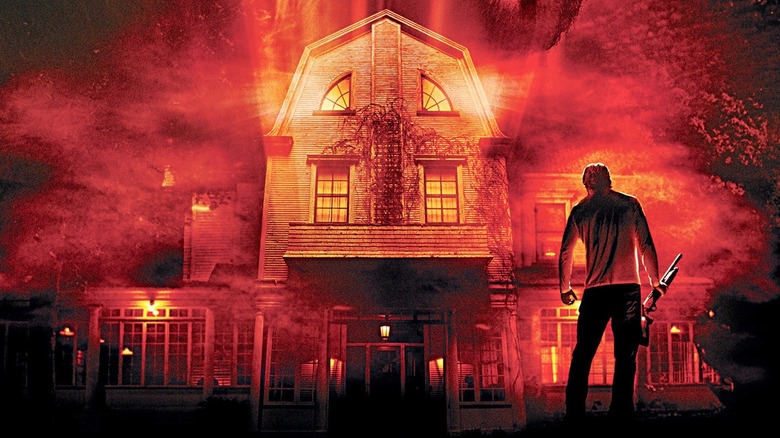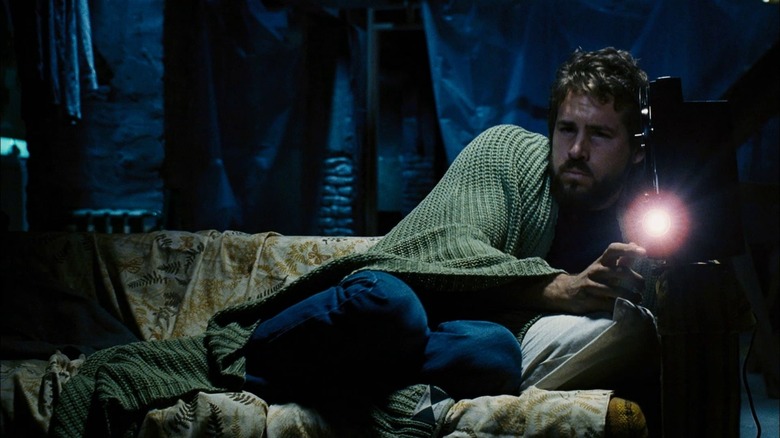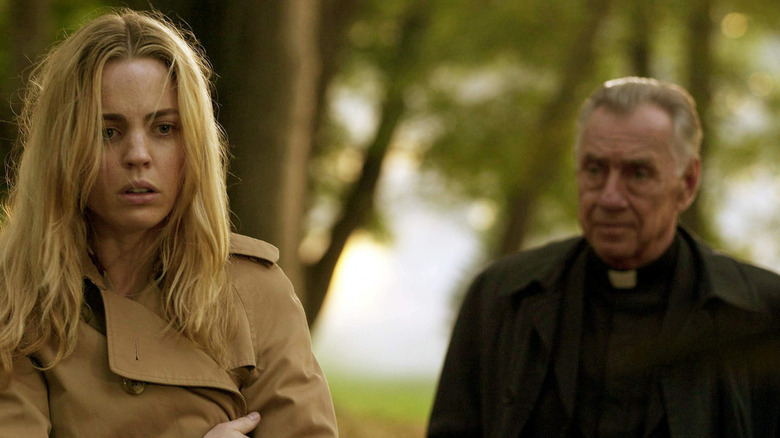Why The Amityville Horror Remake Tried To Ignore The Original's Influence
The year was 2005, and remaking horror movies was becoming the dominant trend of the decade. Up to and including 2005, the decade had already seen remakes of "Willard," "The Texas Chain Saw Massacre," "Boogeyman," "The Fog," "Dawn of the Dead," "Thirteen Ghosts," "The Ring," "The Grudge," and "House of Wax." All of those were prior to the reboots of "Halloween," "Friday the 13th" and "A Nightmare on Elm Street." Mining a previous generation's nostalgia was big business, and remakes — as an overwhelmingly common trend — wouldn't wane until the early 2010s.
Andrew Douglas' 2005 version of "The Amityville Horror" was a little different. Although revisiting the same events covered in Stuart Rosenberg's 1979 film of the same name, both films were based on the "true" story of the Lutz family who, after moving into a real house where real murders had taken place, claim to have encountered an ineffable demonic presence driving them crazy. In reality, Ron DeFeo murdered six members of his own family at 112 Ocean Ave. in Amityville, NY in 1974. The real-life Lutzes claim to have heard voices, described attacks by flies, and eventually hired a priest to come in and purify the house. They moved out after about a month, unable to handle the haunting. Their story was detailed in the hit "Amityville Horror" book, written by Jay Anson. It's since been revealed that the Lutz family were intentionally perpetuating a hoax, but that hasn't stopped horror and haunting and true crime fanatics to occasionally make pilgrimages to New York to see the house.
The 2005 "Amityville Horror" was, upon its release, the ninth film to have been inspired by Anson's book (as of this writing, there are about 35 Amityville films), and director Douglas most certainly had to keep that in mind while filming. Indeed, Douglas opined in an interview with Dread Central that breaking free from the 1979 film's influence was a primary concern. It was a remake, yes, but Douglas wanted to ensure that he could take known facts and still deliver some scares.
New scares
The 2005 version of "The Amityville Horror" stars Ryan Reynolds as George Lutz and Melissa George as Kathy Lutz as they moved into the 112 Ocean Ave. house in 1974. Andrew Douglas has previously directed mostly music videos as well as one documentary feature, and "The Amityville Horror" was his breakout into scripted studio fare. In the Dread Central interview, he talked about not wanting to revisit the original to keep his mind clear:
"I haven't seen the original version since I was a kid, and I deliberately didn't see it here because my understanding was that I was being asked for a new interpretation. So, I mean the script, the kind of basic architecture of the story is right on the original film but I just deliberately didn't see it because I think one of the things I was being asked to do by delivering a new interpretation was to some extent, to try and deliver new scares."
Douglas also sensed that horror fatigue might have begun to settle in the minds of a modern horror audience, especially as is comes to the American filmmaking traditions, even if they possess predictable strengths. The director said:
"We're scared out at the moment. This is a danger. Horror is in such a big thing now that I think one of the reasons we're gravitating so strongly towards Korean, Chinese and Japanese horror films is that we're beginning to tap out our Gothic Edgar Allan Poe or religious scares. In some ways, there's a strength and value to genre and stereotyping; We have an expectation, and as an audience we're comfortable with genre pictures because we have an expectation."
American horror vs. Japanese horror
Douglas continued, framing "The Amityville Horror" as it fit into the then-contemporaneous trend of J-horror and J-horror remakes infiltrating the American market. Douglas' film was released in the midst of films like "The Ring," "The Grudge," "Pulse," "One Missed Call," and many others. For Douglas, the originality of those films' iconography was something he was aware of, and had to stand up against:
"I think that one of the things that, for me, made some of the Japanese films like 'The Ring' and more recently 'The Grudge' so powerful was the iconography of it wasn't Judeo-Christian iconography. It wasn't about good and evil or sin, it was about 'I'm going to scare the s*** out of you. I'm going to have my hair in front of my face and scare the s*** out of you.' Almost without that kind of moral dimension that western horror has, and I just think that's fascinating."
Douglas, luckily, didn't have a preexisting affection for Amityville when going in, ultimately making undue influence easy to ignore:
"I wasn't a huge fan. I saw it as you do as a teenager growing up, but at the time, I wasn't a fan. Even when I was invited to do this, it was sold to me really as a psychological horror, more like 'The Shining.' Which of course was a clever sell because it appeals to your vanity, doesn't it? If they had told me it was going to be a different kind of movie, then maybe not. But certainly, the first courtship and the first proposal from the producers to me were at that level. What we wanted to do with this is make it not a slasher movie but a psychological movie. A movie which is really as much about a dysfunctional family as it is about bleeding walls. When you get down to it, you end up doing both."
Douglas' approach may have been the healthiest: A focus on extant mythology might have distracted from the director's need to tell a more intimate, complex story. There is the psychology of a real-life killer to examine, and real victims to mourn. The further diving into 30-odd films of backstory would have been a distraction, and obsession with canon can sometimes lead a story away from more interesting areas. Douglas' vanity allowed him to make something wholly his.


